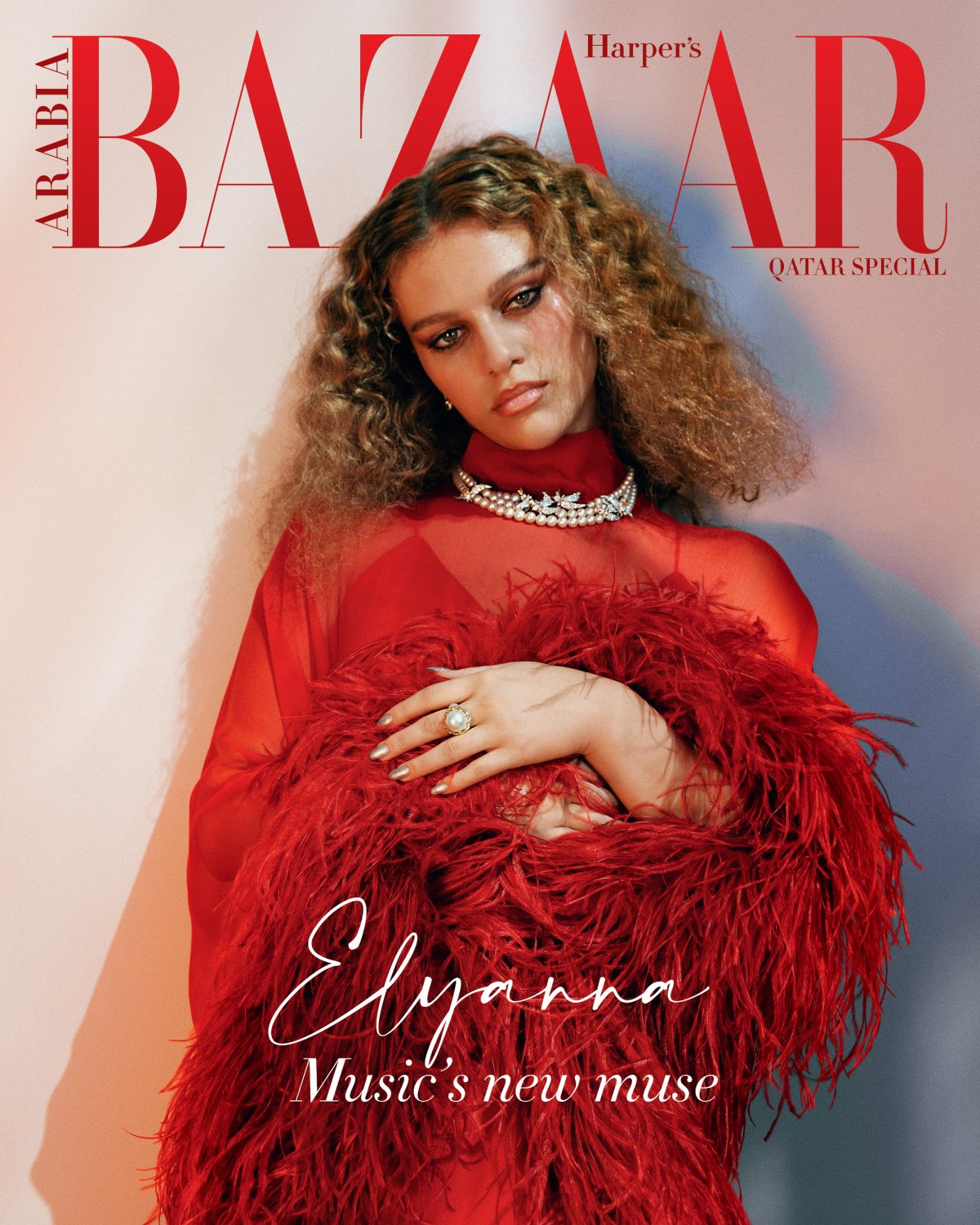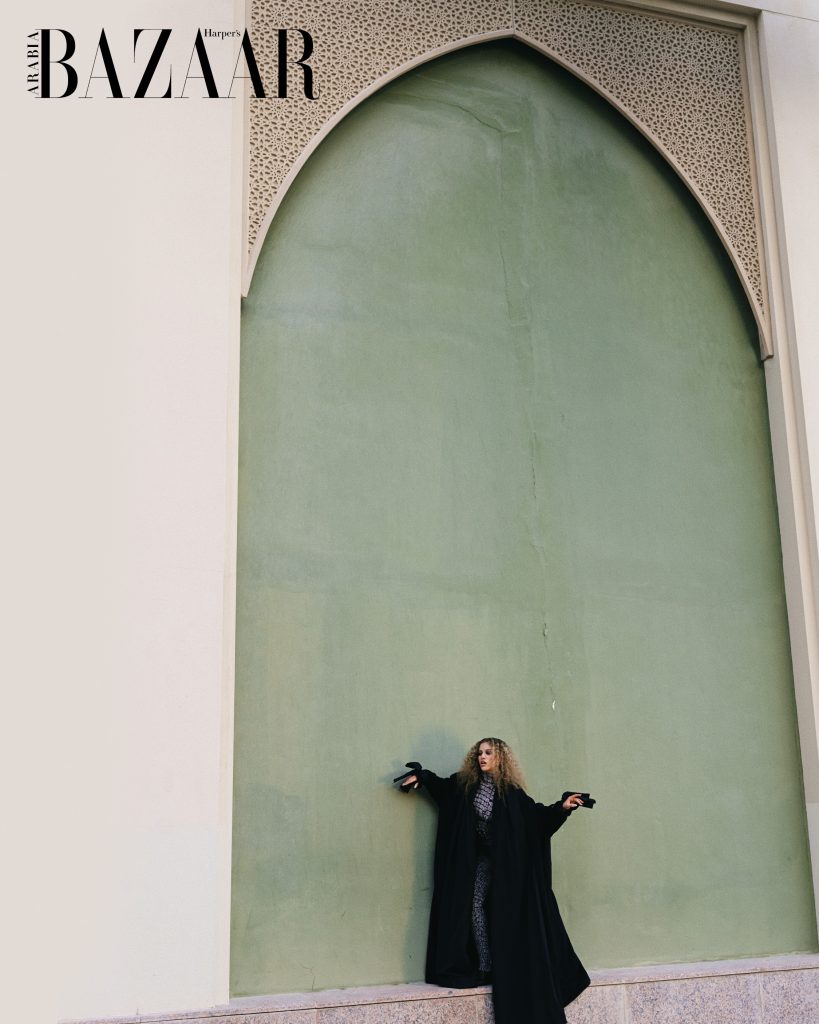
Elyanna On Making Music History At Coachella | Harper’s Bazaar Arabia Qatar Special, Summer 2023 issue
Following her trailblazing performance at the festival, the 21-year-old Palestinian-Chilean singer-songwriter is set for meteoric success
For Arabic music fans, April 15th was a day to remember. Over 45 minutes at Coachella’s Gobi Stage, the world’s most famous music and arts festival welcomed its first ever Palestinian singer and its first-ever artist to perform a full set in Arabic. The artist was Elyanna, a 21-year-old Palestinian-Chilean singer and songwriter whose star is very much on the ascent.
Elyanna’s Trailblazing Performance Marked A Cultural First
Known for her hits including ‘Ghareeb Alay’ and ‘Ala Bali,’ Elyanna’s trailblazing performance marked a cultural first, catapulting her firmly onto the global stage, inspiring a generation of young Arabs, and establishing her as one of the brightest and most lauded emerging talents at this year’s Coachella Valley Music and Arts Festival.

Donning a flowy white cut-out dress and black boots, with flashing green eyes and voluminous hair, she looked every inch the fashion icon. “I’d describe my look as retro-futuristic with a twist of my culture,” she tells Harper’s Bazaar Qatar. “Fashion gets me excited, and putting a look together inspires me. I love creating different hairstyles, embracing my curly hair or braiding it, and using coins, scarfs and bandanas, of course. Growing up, I was always inspired by my sister — who is a designer now — because she loved taking risks. She influenced my style. Together we make a super team because we are daring, fun, and innovative.”

That passion for innovation saw her travel to Doha ahead of her pioneering Coachella performance for the unveiling of Tiffany & Co.’s latest High Jewellery capsule collection, Bird on a Pearl; a reinterpretation of the iconic Bird on a Rock brooch, created by Jean Schlumberger, with the world’s rarest natural pearls. First created by Schlumberger in 1965, the designer’s signature bird, perched on a gemstone, evolves into a suite of exquisite creations set with remarkable natural saltwater pearls. Sourced in the Gulf region and acquired from Mr. Hussein Al Fardan’s private collection for the first time ever, these pearls are prized for their size, shape and unrivaled lustre. Sat in Corinthia Yacht Club, surrounded by Tiffany & Co.’s dazzling creations against a backdrop of blue sea, Elyanna finds affinity with the collection. Both, after all, have accomplished history-making feats. “Tiffany & Co. is a brand that I really look up to because of its commitment to social responsibility and sustainability,” she says. “It’s also a brand that I admire for its elegance and sophistication as well as its timeless designs. I’m so honored to wear and discover the iconic Bird on a Pearl pieces. I love diamonds and pearls and the combination is out of this world.”

Elyanna’s heritage, encompassing Middle Eastern, Chilean, and Western influences, plays out in a musical aesthetic that feels fresh and new. “When it comes to music and art, I always want to feel free,” the artist tells Bazaar. “At 21, I feel I’m mature enough to take risks as far as the production, lyrics, and melodies are concerned. I am currently working on a unique album and I’m so excited about it. I am contributing to every single creative detail. I’m inspired by my Palestinian-Chilean background as well as the American culture that I got to discover growing up in Los Angeles. This blend of cultures broadened my horizons. I was inspired by a lot of genres, jazz in particular. That was all I would sing as a young girl. So I believe who I am today is a result of the music I sang and listened to in my childhood. When I moved to the US, I just connected with Arabic music and my culture so much, it gave me another perspective on the type of music I want to create. Both Western and Eastern music are inherent to me and they just come naturally.”

Her prolific rise has been an inspiration to many; not least because many celebrated Arabic female singers have traditionally struggled to break into international markets. To what does she attribute her growing success? “I have always believed that Arabic music has the potential to be truly international. I was inspired by Western hip-hop tracks of the 2000s where the influence of Arabic beats and melodies was obvious. I think that Arab artists have just lacked the opportunities to make it on the global scene, or maybe they didn’t believe that they could achieve that. When I make music, I do not limit myself to a single type of audience. My culture is present in my music, art and fashion. Arabic is a rich and authentic culture, full of art and unique features, be it the instruments or the dancing or the singing styles. I don’t see any reason why we wouldn’t be able to break the international market. All it takes is for artists to be true to themselves and have the courage to take risks. I’m so grateful that we are in an era in which the world is open to new cultures and new music. A lot of artists worked hard to pave a way for all of us, and I thank them for opening doors for artists like me. My dream is to do the same and pave the way for other artists as well.”

That passion for Arabic music and culture manifested itself in her electric Coachella performance, which featured instruments including the Tableh and the Derbakkeh as well as an Oud, a type of guitar used in many Arabic folklore songs. Her routine incorporated belly dance with a hip-hop feel, and she waved a traditional Palestinian Keffiyeh, a black and white scarf symbolic of Palestinian nationalism, before walking offstage to ecstatic cheers from her fans. “It was truly an honour to take to the stage at Coachella. I’m proud to have shared our Arabic language and culture at the biggest festival in the world. This is a big win for all of us Arabs. A huge thank you to Coachella for seeing my vision and my art and welcoming my culture to their world in the desert. I’ve always wanted to be a performer and an opportunity like this means the world to me. It was also a big responsibility to be able to convey my culture and my music in the right way, so I really worked hard to make sure that my performance left an impact on everyone, Arabs and non-Arabs alike.”

The performance marked the apex of a goal Elyanna had harboured since childhood. “My dream was always to be a singer,” she says. “Everyone who knew me, knew that! When I was 15-years-old, I moved with my family to the United States, where my dreams started to come to life. I caught the attention of the Palestinian Canadian Grammy-award winning singer-songwriter Nasri Atweh, who introduced me to my soon-to-be manager, Wassim “Sal” Slaiby and to the Lebanese-Canadian R&B star Massari. In spring 2021, I signed with Universal Arabic Music launched by Wassim Slaiby, Universal Music Group and Republic Records.”

Starting out at such an early age in the music industry, Elyanna recognised the importance of surrounding herself with the right people.
“It has helped me to preserve my identity throughout my career. I started in this industry at the age of 15 and I have been accompanied by the same team ever since. I’m a long-term thinker and I love building and nurturing relationships with people who see my vision and who are as passionate as me. I learned to be patient and take the time to get to know better the people surrounding me and give them the chance to know me better too. This is where it all starts.”
That ethos is one of many facets that make Elyanna so likeable. During her Harper’s Bazaar Qatar cover shoot in Doha, a city that she loves and hopes to return to soon, she displays kindness and warmth to those around her, exuding a positivity and good energy that feels contagious. Surrounding herself with the right people includes a refreshingly family-orientated approach to her career. Her father, who flew to Doha to join her for the Tiffany & Co. exhibition and gala dinner, is a huge support in her life and she credits her brother Feras, a musician and pianist, as first discovering her potential. “Ever since he heard me singing an Adele song, he believed in my talent. He would always encourage me to sing at school and participate in different talent shows in our hometown of Nazareth. We would shoot song covers and do themed photoshoots in our little backyard at home where my sister Tali would style me. Those covers caught people’s attention.” That familial bond played out in her Coachella performance, with her brother accompanying her on keyboard as they performed the Egyptian ballad ‘Awhak’, a song she said the two of them “used to sing growing up.”

Following her performance, Elyanna received countless messages from fans thanking her for platforming their culture, as well as from fans hearing Arabic music for the first time.
For many young women in particular, she has become an inspirational figure. What advice would she offer them in terms of fulfilling their own dreams? “Women should always support one another. My advice is to focus on achieving a small goal, one day at a time, until you reach your bigger goals. No matter where you come from, if you believe in your dream, surround yourself with the right people, know and accept your strengths and weaknesses, work on yourself relentlessly every day, you will achieve what you are looking for. Do it with passion.”
From Harper’s Bazaar Arabia Qatar Special, Summer 2023 issue
Photography By Raffo Marone. Styling By Laura Jane Brown. Hair: Deena Alawaid. Make-Up: Manuel Losada. Senior Producer: Steff Hawker. Stylist’s Assistant: Sara Hussain.
Special thanks to Corinthia Yacht Club, Doha, Qatar
